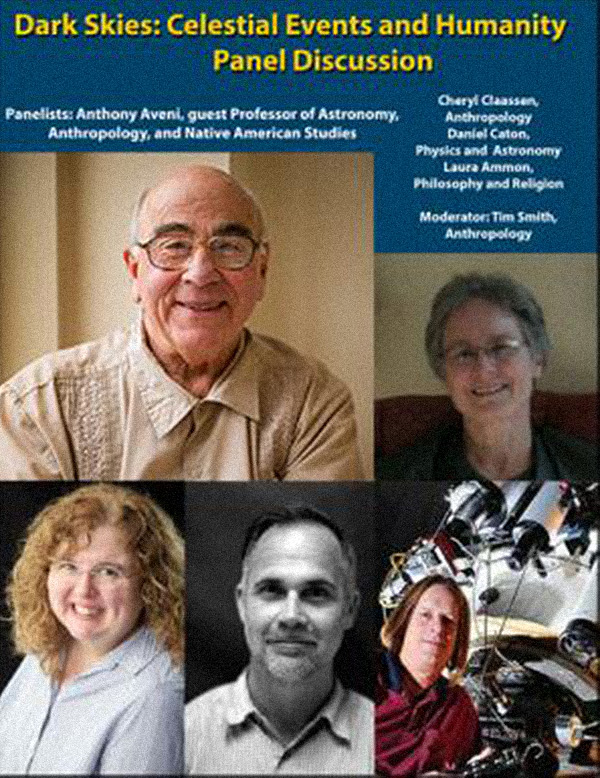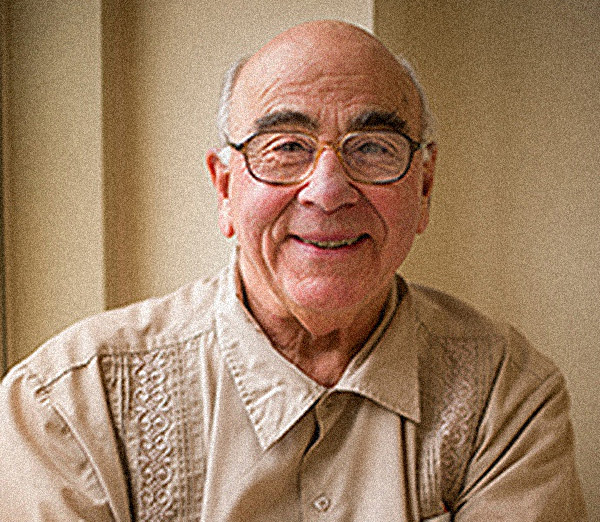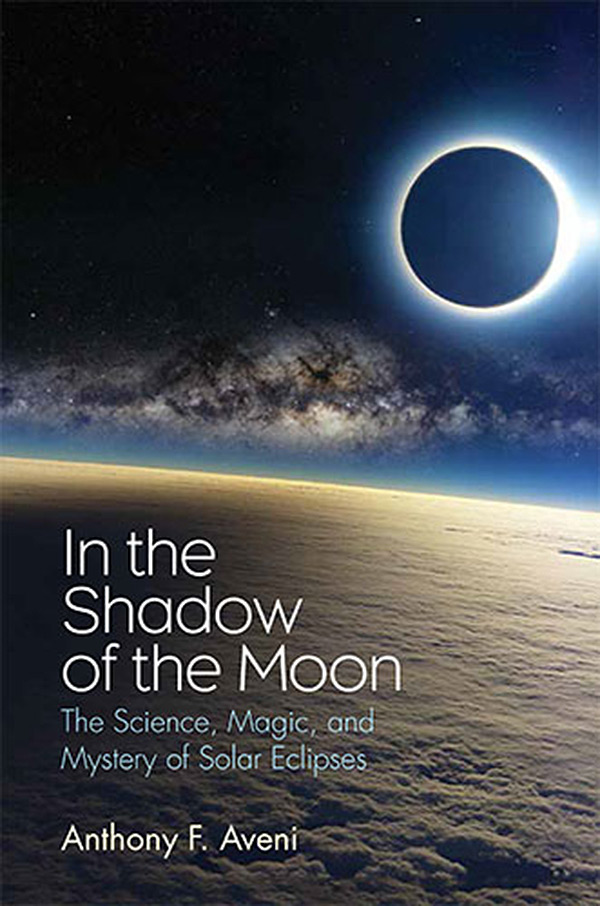
A panel discussion at Appalachian State University on March 28 will feature Dr. Anthony F. Aveni and Appalachian State University faculty Professor Daniel Caton, Physics and Astronomy, Dr. Laura Ammon, Philosophy and Religion, Dr. Cheryl P. Claassen, Anthropology, and Dr. Timothy Smith, Anthropology. Photo submitted.
BOONE, N.C.—On Monday, March 27, Appalachian State University’s College of Arts and Sciences will host Dr. Anthony Aveni, a Russell Colgate Distinguished University Professor, in its seventh annual Dean’s Advisory Council’s Interdisciplinary Lecture series. On the cusp of America’s first coast-to-coast total eclipse of the sun in 99 years, Aveni, author of “In the Shadow of the Moon: The Culture and Science behind the Magic, Mystery, and Fear of Eclipses,” and a witness to eight such events, explores the history and culture surrounding solar eclipses from Babylon to the ancient Maya, telling stories of the different kinds of impact nature’s most dazzling phenomenon had on humanity. The lecture will take place in the I.G. Greer Auditorium at 7 p.m., followed by a book signing.
On Tuesday, March 28, a panel discussion titled “Dark Skies: Celestial Events and Humanity” on the links between astronomy, religion and anthropology will be held at 2 p.m. in the Rough Ridge Room of Appalachian’s Plemmons Student Union. The event will feature Aveni and the following Appalachian faculty: Professor Daniel Caton, Physics and Astronomy, Dr. Laura Ammon, Philosophy and Religion, Dr. Cheryl P. Claassen, Anthropology, and moderated by Dr. Timothy Smith, Anthropology.
Both events are free and open to the public.
Aveni has been featured in Rolling Stone magazine as one of the 10 best university professors in the country. He has been voted the National Professor of the Year by the Council for the Advancement and Support of Education in Washington D.C., which is the highest national award in teaching. At Colgate University, where he has taught since 1963, he has received many other awards such as the Alumni Award for Excellence in Teaching in 1997 and the Phi Eta Sigma National Honor Society Distinguished Teaching Award in 1990.
Next month, Aveni’s new book, “In the Shadow of the Moon: The Culture and Science behind the Magic, Mystery, and Fear of Eclipses,” will be released. In the book, he explains what causes eclipses to occur, along with the knowledge we have acquired from studying them: such as the slowdown in the Earth’s rotation and the shrinking expansion of the sun. There is a pattern in which eclipses come in families, and by analyzing that history astronomers can trace the genealogy of eclipses. Aveni sees the mixture of pleasure and fear expressed in modern eclipse chasers as a way of attempting to cope with the rarely encountered and vast forces of nature that are out of our control.
Aveni’s lecture and the panel discussion are supported by the Dean’s Council and the College of Arts and Sciences, in collaboration with the Humanities Council and the departments of Physics and Astronomy, Anthropology, and Philosophy and Religion.
For further information, contact the College of Arts and Sciences at 828-262-3078 or visit https://cas.appstate.edu. For directions on parking and campus location of events, visit https://maps.appstate.edu. To learn more about the speaker, http://anthonyfaveni.com.
About the College of Arts and Sciences
The College of Arts and Sciences is home to 16 academic departments, three stand-alone programs, two centers and one residential college. These units span the humanities, social sciences, and the mathematical and natural sciences. The College of Arts and Sciences aims to develop a distinctive identity built upon our university’s strengths, traditions and unique location. Our values lie not only in service to the university and local community, but through inspiring, training, educating and sustaining the development of our students as global citizens. There are approximately 5,850 student majors in the college. As the college is also largely responsible for implementing Appalachian’s general education curriculum, it is heavily involved in the education of all students at the university, including those pursuing majors in other colleges.
About Appalachian State University
As a premier public institution, Appalachian State University prepares students to lead purposeful lives. App State is one of 17 campuses in the University of North Carolina System, with a national reputation for innovative teaching and opening access to a high-quality, cost-effective education. The university enrolls more than 21,000 students, has a low student-to-faculty ratio and offers more than 150 undergraduate and 80 graduate majors at its Boone and Hickory campuses and through App State Online. Learn more at https://www.appstate.edu.
What do you think?
Share your feedback on this story.













